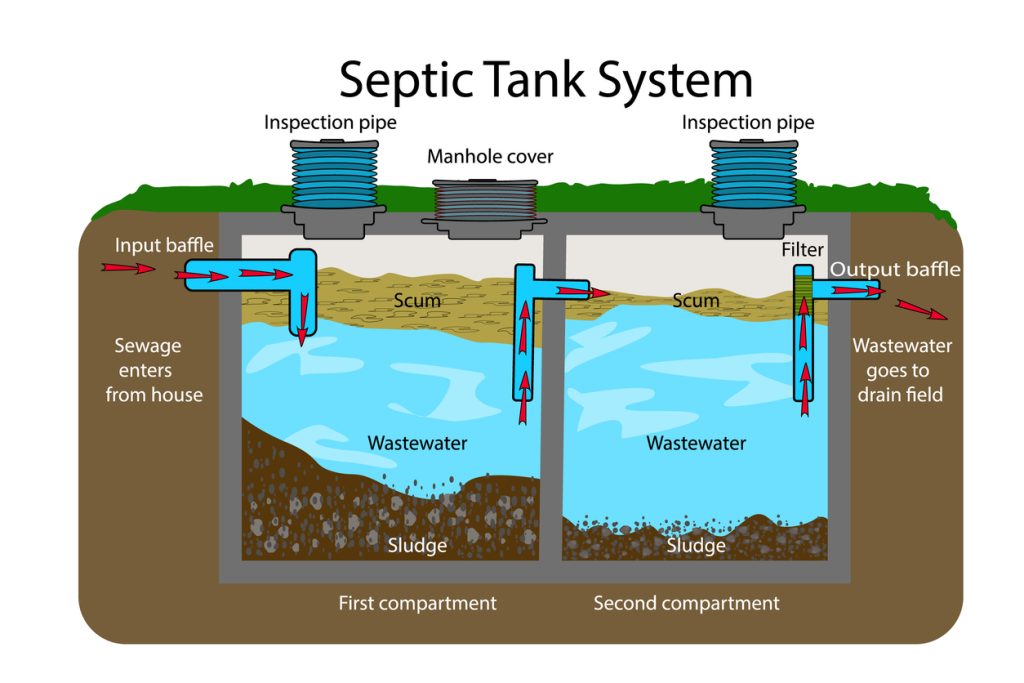A septic system’s failure can put the health of the residents at risk, pollute the surrounding area, and necessitate costly repairs. You must be aware of the potential consequences of neglecting your septic system and practice preventative maintenance as well as proper garbage disposal habits.
Sewage Backup and Overflow
Septic system failure poses a serious health risk if there is regular sewage backup and overflow. If the septic tank fills up too quickly or becomes clogged, sewage can back up into a home. It can also cause unpleasant odors, uncleanliness, and property damage. Direct or indirect contact with raw sewage can spread a wide range of infectious diseases, some of which can be fatal. Additionally, cleanup can be challenging, time-consuming, and expensive.
Groundwater Contamination
When a septic system isn’t functioning correctly, it can contaminate groundwater and nearby water sources, which can have severe consequences for human health and the environment. If contaminants like nitrates, phosphates, and bacteria are introduced to the groundwater, it could severely affect wells and other water sources.
Property Damage
If a septic system fails, it can result in expensive repairs to the interior and exterior of a building. Allowing sewage to back into the living space poses a risk to the home’s structure, furnishings, and belongings. Repairing the damage, replacing the damaged objects, and conducting a thorough cleaning could cost a lot of money. Suppose the septic system overflows onto the property. In that case, it can saturate the soil, resulting in swampy or waterlogged zones, which can hinder adequate drainage and threaten the integrity of structures. Additionally, too much water can harm lawns, gardens, and trees because it encourages the growth of pests and insects.
Regular Maintenance
Homeowners should have a professional septic service provider inspect the system regularly to check for any signs of trouble and provide recommendations for any repairs or maintenance that may be needed. Tank levels, the drain field, and the system are just some things that are checked during an inspection.
Proper Waste Management Practices
When non-biodegradable items like wipes and feminine hygiene products are flushed down the toilet, the plumbing system might become clogged. By minimizing the amount of hazardous chemicals that you put into your septic system, you can keep it in good working order.
If you want to extend the life of your septic system, you should avoid using cleaning products with many harsh chemicals. Harsh chemicals can disrupt the natural balance of bacteria in the septic tank, slowing the waste-decomposition process. Instead, it would be best to use cleaning supplies that won’t harm the ecosystem or the septic system.
Water Conservation
Excessive water use can compromise the system’s ability to filter and store wastewater. By fixing leaks, installing water-efficient appliances and fixtures, and practicing water-saving habits like taking shorter showers and only doing full loads in the washing machine and dishwasher, homeowners can help the environment while saving money.
Our Services
Regular maintenance, careful waste disposal, and drain field protection are all necessary preventative measures to keep a septic system functioning smoothly. Homeowners may protect their septic systems from costly repairs and unexpected problems by being aware of the dangers and taking preventative actions.
Contact us at Brown Aerobic in Houston, TX, for septic tank installation, replacement, and repair services.

